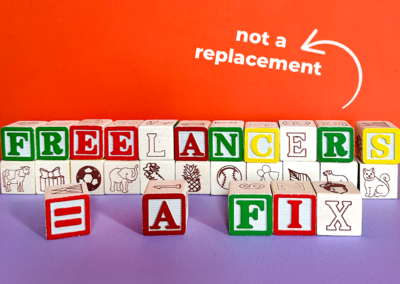Business should not just satisfy our material needs but also some of our spiritual needs; our need for meaning, truth and beauty.
According to a 2017 Gallup Poll, about 80% of Americans say they’re stressed. Many researchers consider it a symptom of a disconnected society where social bonds are frayed and trust has been eroded. And, of course, digital media — and its invasive and persistent hijacking of our attention — hasn’t helped.
Then, there’s another American trait — a relentless drive to efficiency. Getting workers to do more for less has been a driving force in American business, especially since the 70s. In fact, since the 1950s, America has been in an ever-accelerating drive for efficiency. Americans are now 400% more productive than in the 1950s. According to the ILO, “Americans work 137 more hours per year than Japanese workers, 260 more hours per year than British workers, and 499 more hours per year than French workers.”
In the process, it seems to me, we have lost something precious. Our “souls”. Not in a religious sense, but in the sense of our most abundant humanity.
The limitations of typical business models, management, and business cultures have become abundantly clear (and more so during the pandemic), and we now need new visions, paradigms, ways of working, and ways of being. These will likely not come from business books or business schools, but rather from integrating economics, tech, science, the humanities, and the arts. It’ll have to be a leap of our imaginations, a flowering of our minds. This could mean soft and tender as opposed to hard and harsh, or fluid and flexible rather than slow and rigid; poetic rather than numbers-obsessed.
While humans are clearly social, and like to converge in groups — the idea of being confined to a cubicle pretending to be busy for eight hours a day is soul crushing. We know nobody actually ‘works’ that much, but fear, habit and a lack of imagination keep us bound to this idea. In fact, research suggests that in an eight-hour day, the average worker is only productive for two hours and 53 minutes.
But how does business help us get our humanity, our souls, back?
First, we need the kind of leaders that want to bring their whole person, including their ‘souls’, to their roles. It’ll have to start there — because if leaders don’t offer the space, the guidance, and most importantly, setting a personal example for the rest of their organization, it likely won’t happen amongst the rank and file. This won’t be easy — allowing and enabling employees to bring their whole soul to their job flies in the face of ‘efficiency’. Managing whole, feeling humans with all of their fully-expressed foibles, needs, and desires will require patience, time, and commitment.
It’s so much easier for companies to ask people to leave their humanity and souls at home. To be more like unfeeling, productive machines — just numbers on a spreadsheet. But this is a ‘false narrative’. People might pretend to be machines, but they are not. And forcing this pretense on them is corrosive — even to a company’s bottom line.
These days ‘employee engagement’ is considered some sort of holy grail. But a recent Gallup survey showed that more than half of the American workforce say they’re disengaged at work. Studies of the next generation workforce show most younger employees want meaning and personal growth at work. Of course at the same time, business managers and leaders face withering pressure to deliver performance and results in a volatile, uncertain, complex, and ambiguous world. They are often pressured to deliver short term dividends over long term growth.
About 25 years ago, Peter Senge, (a senior lecturer at the MIT Sloan School of Management, and the founder of the Society for Organizational Learning) asked leaders to build learning organizations. Organizations in which people are seen as parts of the whole; active participants in shaping their own reality, rather than just reacting to a pre-ordained environment. He rightly viewed traditional business as orientated towards controlling and performing — enforcing reliability — instead of spaces for learning, adapting, and natural curiosity.
More recently, Frederic Laloux (writer of Reinventing Organizations, and proponent of ‘the enlightened organization”) researched a of a dozen companies for his book, and showed a new perspective of how people collaborate in organizations.(5) Metaphors such as “machine “ and “family” are being replaced with “living organism” or “living system,” showing an emphasis on more wholeness, freedom, complexity and consciousness. In practical terms, enlightened organizations would end, or at least, adapt the idea of profit, and place a much greater focus on sustainability.
This can be achieved with a new way of viewing self-management and peer relationships — without the need for hierarchy or consensus. For this to work, leaders need to lead in new ways. Creating and holding space for serendipity and innovative ways of operating and creating, as well as being role models and cheerleaders without the heft of hierarchical power.
This will help create one of the most important things needed for this to be workable: trust. There’s a strong correlation between countries that rate highly for happiness (Finland, Denmark, Switzerland, etc.) and high levels of trust in their institutions and fellow citizens. In America, by comparison, two-thirds of adults think other Americans have little or no confidence in the federal government, and interpersonal trust has also suffered a precipitous decline, with low trust specifically affecting young people. Vulnerability thrives where there’s trust, and vulnerability is key to building strong relationships.
America’s business is business; but the human soul has not found its place in this narrative. Frankly, business has been hostile to the very idea. The result is that people leave their vulnerability, emotions, and intuition at the door, entering only as a shell of themselves and their potential. If our full humanness is not seen and welcomed in the workplace, businesses lose the best of our creativity and adaptive problem-solving skills — this is crucial in a complex world.
Some organizations have transformed to deliberately developmental organization models (DDO) — looking to transform human potential in business. In these organizations, people are seen as ends, not means — and the key to success is developing everyone. This is detailed in the excellent book, An Everyone Culture: Becoming a Deliberately Developmental Organization, by Robert Kegan and Lisa Laskow Lahey. DDO-thinking suggests that creating culture is the main work of strategy and that culture is essential to developing people and business.
Peter Drucker, ”the man who invented management,” was famously attributed the quote “culture eats strategy for breakfast.” Essentially, the key to implementing any strategy is the culture of the organization. If organizational culture is this powerful and important, why don’t more companies develop it?
What if the main business strategy was to develop culture?
It’s worth considering in the light of the price we pay when we lose our souls.
An organization I’ve been part of for years, The House of Beautiful Business, is a global platform and community with a mission to “make humans more human and business more beautiful.” They do this by bringing many disciplines together – these include nonprofit leaders, technologists, scientists, philosophers, and artists. This seems like a good way to untangle the constrained, narrow thinking that defines much of today’s corporate cultures. Clearly the most essential is a shift in consciousness, and a different way of defining ‘success.’
However, there are some practical things that can be done. Via Deloitte, the most obvious is to be inclusive. Inclusive workplaces are 6x as likely to be innovative, and have 2.3x the cash flow per employee over non-inclusive workplaces in a 3-year period. Physical, social, community, career, and emotional elements all play a role. It’s simple human things. Appreciation, collaboration, recognition, community, self-management, wholeness and purpose. Even some poetry, music, plants, pets, comfort will work wonders.
Perhaps the most important thing is to make people care about what they’re doing.
To give them purpose and meaning.
“People find meaning when they see a clear connection between what they highly value and what they spend time doing,” says David Ulrich, author and professor of business at the University of Michigan. Business-as-usual might be dead, (or dying). But the desire for a more beautiful life is as alive and urgent as ever.
Theo’s Socials: LinkedIn, Twitter
Editor’s Socials – Joe Cole: LinkedIn, Twitter



